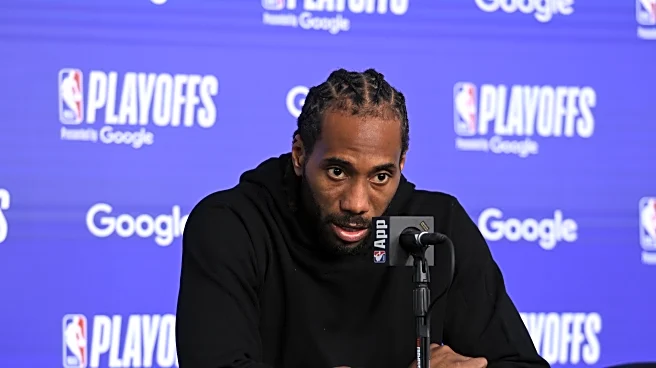No NBA story has been hotter over the last two days than the news of the Los Angeles Clippers potentially circumventing the NBA salary cap with shady endorsement dollars funneled to franchise superstar
Kawhi Leonard. The topic hasn’t burned up the Blazer’s Edge Mailbag like juicy Trail Blazers topics do, but we’ve had a few questions. Let’s tackle the matter today.
Dave,
The Clippers are outright cheating with Kawhi Leonard don’t you think? It’s not a matter of whether this is bad but how much. How serious do you think this is? How serious will the league take it? What do you think the penalties should be? Thanks in advance!
Jon C
The C does not stand for Clipper fan.
This should be among the most serious disciplinary matters to come before the league in years. It strikes at the heart of competitiveness and the sanctity of the salary cap. Those are bedrock issues for the NBA. If not, why do they bother with 600 pages of documents covering this stuff? The actual NBA rulebook ends up less than 100 pages, judging by the version released on NBA.com. These agreements are arguably more weighty than the sport itself.
The league will have to go through a series of evaluations to determine whether there was a violation and, if so, how serious it was.
The first question will be whether Leonard was paid for legitimate endorsement services by the now-bankrupt Aspiration company. If the job was real, the violation is less obvious.
Here is what I’ve been able to gather so far. Leonard was paid $28 million. That sum was rendered for intermittent tweets and/or mentions, something in the range of monthly. Actual execution of the endorsement may have been optional. And, as is true of many local endorsements, the agreement was only in force as long as Leonard remained a member of the Clippers organization.
As many have noted, the sum raises immediate red flags. Leonard is a popular figure, no doubt. But for perspective, Taylor Swift reportedly made $26 million for a series of television ads for Diet Coke back in 2014. Inflation is real, so a 2025 deal would be worth more than one a decade ago, but that was, at the time, the biggest endorsement for the biggest and hottest star in existence from one of the biggest companies in the universe. Swift’s brand recognition is bigger than LeBron James’ at this point. Kawhi Leonard is miles south of James, let alone Tay-Tay. Getting over $2 million per month for a retweet seems…excessive.
The ancillary details add smoke to the fire. If execution was optional and the contract was tied specifically to Leonard’s service with the Clippers, the temperature rises. No matter how logically those points are defended, they look an awful lot like ways to slip salary to someone in the finest mob-like tradition. We can point to videos of the Swift Diet Coke commercials as evidence she did something. Even if Leonard clicked a button on his phone once a month, how is that millions of dollars worth of value to a local company? If he ever missed those obligations, it gets even worse.
The next big issue is how much, and how directly, the Clippers and their owner Steve Ballmer were involved with the company paying Leonard.
The current CBA is pretty clear that money funneling to players from the team in any way, even through third parties, is a violation of the salary cap. There are two levels of violation, though, and the distinction between them gets gray.
The first violation, described in Article XIII, Section 1 of the CBA, says this:
It shall constitute a violation of Section 1(a) above for a Team (or
Team Affiliate) to enter into an agreement or understanding with any
sponsor or business partner or third party under which such sponsor,
business partner, or third party pays or agrees to pay compensation for
basketball services (even if such compensation is ostensibly designated as
being for non-basketball services) to a player under Contract to the Team.
Such an agreement with a sponsor or business partner or third party may be
inferred where: (i) such compensation from the sponsor or business partner
or third party is substantially in excess of the fair market value of any services
to be rendered by the player for such sponsor or business partner or third
party; and (ii) the Compensation in the Player Contract between the player
and the Team is substantially below the fair market value of such Contract.
So, a team can’t agree to a sponsorship with Company X explicitly in exchange for Company X paying the team’s player a lucrative endorsement deal in excess of what’s normal under those circumstances. Leonard’s situation seems to apply.
Here’s the catch. Penalties for violating this section in a first-time offense are limited to the following:
- Fines up to $4.5 million
- Loss of one first-round draft pick
- Voiding the player’s contract with the team
- Voiding the endorsement deal
There’s another section, though, covering unauthorized agreements. Section 2 reads thus:
At no time shall there be any agreements or transactions of any kind
(whether disclosed or undisclosed to the NBA), express or implied, oral or
written, or promises, undertakings, representations, commitments,
inducements, assurances of intent, or understandings of any kind (whether
disclosed or undisclosed to the NBA), between a player (or any person or
entity controlled by, related to, or acting with authority on behalf of, such
player) and any Team (or Team Affiliate):
i. concerning any future Renegotiation, Extension, or other
amendment of an existing Player Contract, or entry into a
new Player Contract; or
ii. except as permitted by this Agreement or as set forth in a
Uniform Player Contract (provided that the Team has not
intentionally delayed submitting such Uniform Player
Contract for approval by the NBA), involving compensation
or consideration of any kind or anything else of value, to be
paid, furnished, or made available by, to, or for the benefit
of the player, or any person or entity controlled by, related
to, or acting with authority on behalf of the player; or
iii. except as permitted by this Agreement, involving an
investment or business opportunity to be furnished or made
available by, to, or for the benefit of the player, or any person
or entity controlled by, related to, or acting with authority on
behalf of the player.
Here are the questions at hand. Did Steve Ballmer (allegedly) funnelling $50 million to Aspiration violate the second (ii) paragraph of Section 2? Was Leonard signing with the Clippers in the first place influenced by this kind of deal, thus potentially violating the first (i) paragraph as well?
This is crucial, because violations of Article XIII, Section 2 are much more severe than Section 1. They include:
- Fines of up to $7.5 million
- Forfeiture of an unspecified number of draft picks, presumably unlimited at the league’s discretion
- Voiding of the player’s contract
- Voiding the illegal agreement and “disgorgement” (or forfeiting) all proceeds earned from that agreement
- Suspension of all team personnel willfully involved for up to one year
My thought is that since Section 1 specifically mentions endorsements, arbiters and appellant courts might end up ruling that it covers the situation at hand, leaving the penalties limited to those on the first list.
To me, this isn’t enough. When shaded towards the worst possible explanation–which I feel is warranted here, or at least should be heavily suspected until Kawhi Leonard releases multiple platinum albums, earns $1 billion on tour, and starts dating members of the Kelce family, thus meriting this kind of agreement–this is a direct and blatant attempt to attract one of the best players in the league to a particular franchise by ensuring compensation above and beyond salary cap boundaries. It’s a sneaky way to win the free agent wars using methods that only ultra-billionaires and/or huge market teams can employ. If Steve Ballmer really does throw $50 million at a company without any oversight over that investment or any knowledge that said company is paying an exorbitant amount to one of his own players to do, essentially, nothing, well…I’d like to talk to Mr. Ballmer about an exciting opportunity to fund the new start-up, Clipper’s Edge. We promise we will also tweet once a month. I’ll even throw in an Instagram post for free.
The last serious violation of cap rules came when the Minnesota Timberwolves illegally negotiated with forward Joe Smith back in 2000. The league voided Smith’s contract and took five (5) first-round picks away from the ‘Wolves as penalty for that incident.
Leonard was arguably a bigger free agent than Smith when he signed with the Clippers in 2019. We cannot establish that this endorsement plan played no role in him signing and/or staying with the Clippers rather than joining the Lakers or another team. Employing outside entities makes the situation even worse to me. If the Clippers and Leonard had illegally discussed an NBA contract, at least the eventual agreement would have fallen within salary cap rules, becoming bounded and competitive in measure with all other contracts. Working outside of the salary cap system entirely leaves no limits and no oversight. Why $28 million for Leonard? Why not $200 million from a different shell company to attract other NBA MVP’s and future Hall-of-Famers? Who will even know, let alone enforce competitive balance?
That’s why I think the NBA needs to bring the hammer down hard here, making an example of the Clippers in a way that makes every other franchise and owner think twice.
Leonard has been with the Clippers for six years. I think it would be commensurate to dock the franchise a first-round pick for every one of those years. Understanding that many of the picks in their immediate future have already been traded, I would specify the next six picks that they’d actually get to execute. By my count, that would be 2030-2036 if there are no pick swaps in the interim. Either way, it’ll be midway through next decade before they get to make another first-round selection.
I would also void the final two years of Leonard’s contract, making him an immediate unrestricted free agent. If possible, I would prohibit him from re-signing with the Clippers until at least 2028, when his current deal would have expired organically.
Assuming the allegations are borne out, I would also require Leonard to disgorge the proceeds from the endorsement deal and suspend Ballmer for the year.
As a sop to the Clippers and their leadership, I will admit that it might be possible that their story of not knowing/understanding holds water from their point of view. I would counter that unintentionally breaking a boundaried, legal agreement and the system built on it is just as bad as intentionally breaking it. It’s up to each franchise to make sure that all transactions are scrupulous and above reproach. Failure to do that is as bad as intentionally violating the rules.
I doubt that the NBA will go this far, but you didn’t ask for their viewpoints and constraints, rather mine.
I hope, at least, that they’ll be able to impact the Clippers’ drafting ability severely, as that’s one of the main remedies listed in the agreement. Courts tend to rule strictly in external matters. Money is a universal medium. There’s only so much you can impact that because it touches all areas of life. They are often more lenient when it comes to internal matters. Draft picks are an NBA creation and pertain only to NBA workings. You can’t spend a first-round pick at McDonald’s or argue that it’s a Bill of Rights issue simply by being executed or not. There might be wiggle room for bigger penalties with picks than anything else. And yeah, if these allegations hold true, I’m in favor of the biggest possible.
Thanks for the question! You can always send yours to blazersub@gmail.com and we’ll try to answer as many as possible!










